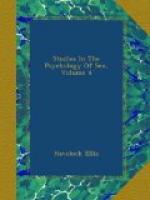This fact may not always be obvious to human nostrils,
apart from intimate contact, but it is well known
to dogs, to whom their masters are recognizable by
smell. When Hue traveled in Tibet in Chinese
disguise he was not detected by the natives, but the
dogs recognized him as a foreigner by his smell and
barked at him. Many Chinese can tell by smell
when a European has been in a room.[32] There are,
however, some Europeans who can recognize and distinguish
their friends by smell. The case has been recorded
of a man who with bandaged eyes could recognize his
acquaintances, at the distance of several paces, the
moment they entered the room. In another case
a deaf and blind mute woman in Massachusetts knew
all her acquaintances by smell, and could sort linen
after it came from the wash by the odor alone.
Governesses have been known to be able when blindfolded
to recognize the ownership of their pupil’s
garments by smell; such a case is known to me.
Such odor is usually described as being agreeable,
but not one person in fifty, it is stated, is able
to distinguish it with sufficient precision to use
it as a method of recognition. Among some races,
however this aptitude would appear to be better developed.
Dr. C.S. Myers at Sarawak noted that his Malay
boy sorted the clean linen according to the skin-odor
of the wearer.[33] Chinese servants are said to do
the same, as well as Australians and natives of Luzon.[34]
Although the distinctively individual odor of most persons is not sufficiently marked to be generally perceptible, there are cases in which it is more distinct to all nostrils. The most famous case of this kind is that of Alexander the Great, who, according to Plutarch, exhaled so sweet an odor that his tunics were soaked with aromatic perfume (Convivalium Disputationum, lib. I, quest. 6). Malherbe, Cujas, and Haller are said to have diffused a musky odor. The agreeable odor of Walt Whitman has been remarked by Kennedy and others. The perfume exhaled by many holy men and women, so often noted by ancient writers (discussed by Goerres in the second volume of his Christliche Mystik) and which has entered into current phraseology as a merely metaphorical “odor of sanctity,” was doubtless due, as Hammond first pointed out, to abnormal nervous conditions, for it is well known that such conditions affect the odor, and in insanity, for instance, the presence is noted of bodily odors which have sometimes even been considered of diagnostic importance. J.B. Friedreich, Allgemeine Diagnostik der Psychischen Krankheiten, second edition, 1832, pp. 9-10, quotes passages from various authors on this point, which he accepts; various writers of more recent date have made similar observations.
The odor of sanctity was specially noted at death, and was doubtless confused with the odor mortis, which frequently precedes death and by some is regarded as an almost certain indication of its approach. In the British




